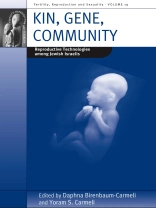Israel is the only country in the world that offers free fertility treatments to nearly any woman who requires medical assistance. It also has the world’s highest per capita usage of in-vitro fertilization. Examining state policies and the application of reproductive technologies among Jewish Israelis, this volume explores the role of tradition and politics in the construction of families within local Jewish populations. The contributors—anthropologists, bioethicists, jurists, physicians and biologists—highlight the complexities surrounding these treatments and show how biological relatedness is being construed as a technology of power; how genetics is woven into the production of identities; how reproductive technologies enhance the policing of boundaries. Donor insemination, IVF and surrogacy, as well as abortion, pre-implantation genetic diagnosis and human embryonic stem cell research, are explored within local and global contexts to convey an informed perspective on the wider Jewish Israeli environment.
Tabella dei contenuti
List of Tables and Figures
Introduction: Reproductive Technologies among Jewish Israelis: Setting the Ground
Daphna Birenbaum-Carmeli and Yoram S. Carmeli
PART I: KIN: REPRODUCTIVE TECHNOLOGIES AND THE QUEST FOR BIOGENETIC PARENTHOOD
Chapter 1. The Contribution of Israeli Researchers to Reproductive Medicine: Fertility Experts’ Perspectives
Shlomo Mashiach, Daphna Birenbaum-Carmeli, Roy Mashiach and Martha Dirnfeld
Chapter 2. The Regulation of Preimplantation Genetic Diagnosis for Sibling Donors in Israel, Germany and England: A Comparative Look at Balancing Risks and Benefits
Yael Hashiloni-Dolev and Shiri Shkedi
Chapter 3. The Man in the Sperm: Kinship and Fatherhood in Light of Male Infertility in Israel
Helene Goldberg
Chapter 4. The Last Outpost of the Nuclear Family: A Cultural Critique of Israeli Surrogacy Policy
Elly Teman
Chapter 5. Adoption and Assisted reproduction Technologies: A Comparative Reading of Israeli Policies
Daphna Birenbaum-Carmeli and Yoram S. Carmeli
PART II: GENE: REPRODUCTIVE TECHNOLOGIES AND THE QUEST FOR THE PERFECT CHILD
Chapter 6. Genetic Testing and Screening in Religious Groups: Perspectives of Jewish Haredi Communities
Barbara Prainsack and Gil Siegal
Chapter 7. Ultrasonic Challenges to Pronatalism
Tsipi Ivry
Chapter 8. Abortion Committees as Agents of Eugenics: Medical and Public Views on Selective Abortion following Mild or Likely Fetal Pathology
Nitzan Rimon-Zarfaty and Aviad Raz
Chapter 9. Cultural Values in Action: The Israeli Approach to Human Cloning
Gali Ben-Or and Vardit Ravitsky
PART III: COMMUNITY: A SELF-PORTRAIT WITH TECHNOLOGY
Chapter 10. Art, Community and Beyond: Human Embryonic Stem Cell Research in Israel
Interviews with Prof. Nissim Benvenisty and Prof. karl Skorecki Interviewer: Daphna Birenbaum-Carmeli
Chapter 11. Medicine and the State. The Medicalization of Reproduction in Israel
Yali Hashash-Daniel
Chapter 12. The Mirth of the Clinic: The Banality of Conception in an Israeli Fertility Clinic
Susan M. Kahn
Chapter 13. Between Reproductive Citizenship and Consumerism: Attitudes Towards Assisted Reproductive Technologies among Jewish and Arab Israeli Women
Larissa Remennick
Chapter 14. Ethnography, Exegesis, and Jewish Ethical Reflection: The New Reproductive Technologies in Israel
Don Seeman
Notes on Contributors
Circa l’autore
Daphna Birenbaum-Carmeli is a medical sociologist at the University of Haifa, Israel. Her research concentrates on reproduction-related issues and the interface of health care and state politics. Birenbaum-Carmeli has published extensively in major professional journals and is the author of Tel Aviv North: The Making of a New Israeli Middle Class (Hebrew University Press) and the co-editor (with Marcia C. Inhorn) of Assisting Reproduction, Testing Genes: Global Encounters with New Biotechnologies (Berghahn Books).












